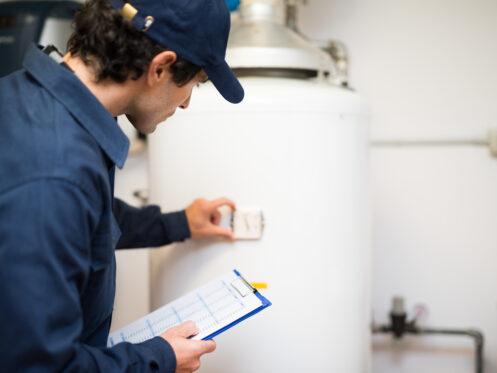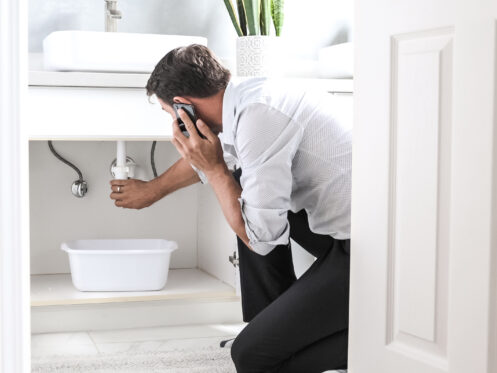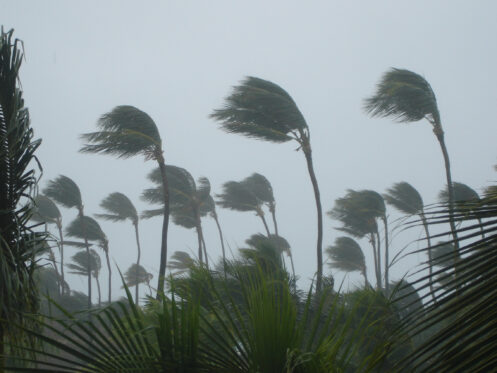Homeowners in Jacksonville Beach, FL, face unique environmental and weather factors that impact their plumbing systems. Excessive humidity hastens the deterioration of plumbing parts and encourages mold formation. Heavy rains that occur from time to time in the area may also put a strain on the plumbing system and cause problems with drainage. Neglecting plumbing problems can weaken the structural integrity of your home, resulting in expensive repairs and even health risks.
1. Water Leaks
Leaks, if left unchecked, can cause significant water damage, mold development, and structural problems for your home. Corrosion, broken seals, and improper connections are common reasons for water leaks in most houses. Contacting a plumber promptly to address leaks prevents more damage, saves water, and keeps indoor air healthy. You should always leave water leaks in the hands of a professional. It requires finding the source of the leak, tightening any loose connections, and replacing any broken seals. Plumbers often use pipe wraps and sealants to fix leaks to reduce repair costs.
An improved plumbing system with a water leak detector can help catch issues early. Smart gadgets that automatically turn off the water supply are one kind, while moisture sensors are another. Moisture sensors resemble a smoke alarm and give you an audible alert when there is a plumbing problem. Alternatively, with their ability to provide real-time warnings and remote monitoring, smart water leak detectors are highly recommended for complete coverage. They are equipped with probes to detect changes in moisture levels and can send an alert to your smart device if there is an issue. You can keep your plumbing system in good working order by installing these detectors and taking action quickly when they identify a leak.
2. Clogged Pipes
Several issues will arise from clogged pipes, such as sluggish drainage, backups, water damage, and even possible health risks. Soap scum and hair can easily block pipes, so it’s important to use drain screens to keep them clear. Screens enable water to flow while capturing particulates in sink, shower, and bathtub drains. Depending on the size of your drain, you may need to use mesh or perforated screens, both of which are excellent solutions. Cleaning the screens daily keeps them in top working order. A plumber can help you choose the best screens for your home and make sure you choose the right size.
Don’t try to unclog pipes with corrosive chemicals, such as hydrochloric acid or sulfuric acid. The harsh chemicals found in commercial drain cleaners degrade pipes to the point where they burst or collapse entirely. In addition to posing a threat to plumbing, harsh chemicals have the potential to contaminate groundwater. To unclog drains without causing harm, try using a solution of vinegar and baking soda. If this doesn’t work, contact a plumber right away.
3. High Water Pressure
Installing a pressure regulator protects the plumbing in a house by avoiding damage and leaks caused by high water pressure. They can also extend the lifetime of appliances like dishwashers. There are two main kinds of pressure regulators: adjustable and non-adjustable. It’s imperative to pick the one that works with your plumbing system and meets your water pressure requirements. While non-adjustable regulators are more basic, adjustable ones provide more customization options. For complete plumbing system protection, have the pressure regulator sized for the home’s water supply and installed by an expert.
4. Hard Water
Water softeners remove minerals like calcium and magnesium, reducing water’s hardness. In Florida, a state with notoriously hard water, softener systems keep pipes and appliances clean and free of scale buildup. Homeowners can avoid scale-related problems and keep water-using appliances running efficiently with regular softener maintenance.
6. Water-Wasting Fixtures and Appliances
Your plumbing system will use less water and save money if you install low-flow fixtures. To save water without compromising performance, install low-flow toilets, aerated faucets, and water-efficient showerheads in the bathroom. Installing water-saving appliances, such as low-flow laundry machines and dishwashers, is also a good idea. These fixtures lower water use, reducing utility costs and easing pressure on the plumbing system. Additionally, they promote sustainability and effective water use in the home.
7. Worn-Out Aerators
The aerators in your faucets are essential to your plumbing system because they control the water flow and stop splashing. However, these aerators can wear out over time, and silt and debris that accumulate in them can alter the quality and pressure of the water. To check the aerator’s condition, detach it from the faucet. A plumber can replace it if it is clogged or damaged.
8. Water Heater Issues
Sediment accumulation, thermostat failure, and corrosion are typical reasons for water heater problems. Flushing the water heater regularly, usually once a year, is integral preventative maintenance that will keep it running efficiently, reliably, and free of expensive issues. To flush a water heater, a plumber will switch it off, hook up a hose to the drain valve, and empty the tank to eliminate accumulated sediment. This method eliminates problems like blockages while maximizing heating efficiency. The plumber will replace your thermostat or corroded parts if they are the issue.
9. Faulty Backflow Prevention
A faulty backflow prevention device can lead to water contamination and serious health risks. The purpose of backflow prevention devices is to stop polluted water from reentering the home’s drinkable water supply. Check valves, air gaps, and reduced pressure zone devices are all examples of backflow prevention measures. These devices are essential for keeping water clean. Choosing the right type may depend on the home’s specific plumbing setup and local regulations. No matter what type you use, regular maintenance and testing are necessary. A plumber will check backflow prevention devices thoroughly during routine plumbing maintenance.
10. Cracked Septic Tank
A cracked septic tank leads to various issues, including potential environmental contamination, groundwater pollution, and unpleasant odors. Regardless of the septic system your home uses, it needs regular maintenance to function correctly. During the inspection phase of maintenance, a plumber will make sure there are no leaks or obstructions and that the bacterial activity is as it should be. Finding issues early on, such as cracks or too much sludge, saves money on repairs and keeps pollution out of the environment. Most experts recommend septic system inspections at least once every three years.
11. DIY Plumbing
Do not risk damaging your plumbing system or making costly mistakes by doing plumbing jobs on your own. Professional plumbers can detect issues, correct them, and prevent further damage. The results of do-it-yourself repairs could be subpar, leading to leaks and other hazards. The pros will always follow safety precautions, comply with local codes, and keep the system running efficiently.
Buehler Air Conditioning & Plumbing offers a range of services to help you relax in the comfort of your home. We install, repair, and maintain air conditioners and heaters. We also provide indoor air quality solutions and install HVAC zoning. Contact us right away to learn how regular plumbing maintenance can help you avoid common plumbing problems Jacksonville Beach homeowners face.




